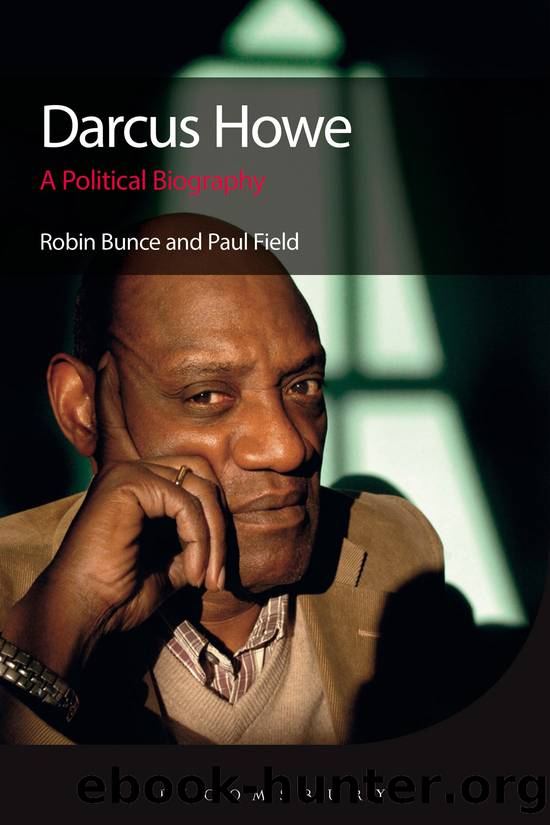Darcus Howe by Bunce Robin Field Paul

Author:Bunce, Robin, Field, Paul
Language: eng
Format: epub
Publisher: Bloomsbury Publishing
Editing Race Today
Howe’s appointment was made public on 6 November 1973. The Guardian announced:
Race Today, former magazine of the Institute of Race Relations, has a new editor, a black activist who promises to steer the magazine yet further from its quasi-academic origins towards the front lines of racial politics.
Speaking to the Guardian, Howe set out a new direction thus:
We have for a long time been told to use the power of the white liberals. But we must now use our own power: we have to show how it can be used.
(Ibid.)
The new direction became clear through a series of early editorials. They stressed a series of themes: the centrality of self-organization, the Jamesian nature of the paper, the different historical experiences of the black and white working classes and the possibility for greater radicalization presented by the relatively anti-labour policies of the Heath government.
Howe’s first editorial, ‘From Victim to Protagonist’, signalled a radical break with the past. Rather than proceed on ‘liberal’ assumptions that black people were ‘helpless victims’, Race Today would reflect the ‘self-activity’ of the ‘Caribbean and Asian peoples’. The editorial concluded with a recognizably Jamesian coda:
Our task is to record and recognise the struggles of the emerging forces as manifestations of the revolutionary potential of the black population. We recognise too the release of intellectual energy from within the black community, which always comes to the fore when the masses of the oppressed by their actions create a new social reality. Race Today opens its pages to the tendency which seeks to give theoretical clarification to independent grass roots self-activity with a view to its further development.
(Howe 1974a: 3)
This was radical, even for the new IRR, an implicit criticism of the stance of the Institute under Sivanandan. For Howe, the IRR had become too focused on black people as victims. He wanted to use Race Today to present black people as agents of change.
The February editorial addressed the Energy Crisis, the issue dominating contemporary politics. In the context of the miner’s strike, Howe argued that anti-government feeling existed in black and Asian communities to a much greater extent than it did in the white working class. The roots of this disparity, he argued, were historical: the British working class had been socialized by capitalism for more than 400 years, whereas the mores of the new arrivals were at greater variance with prevailing values. Nonetheless, the editorial held out the possibility of black and white workers finding a common cause, something that had been impossible, on an ongoing basis, since the explosion of white working-class racism in 1958 (Howe 1974b: 35).
Howe’s third editorial was on a similar theme. Discussing the relative positions of the white and black working class, ‘Bringing it all back home’ argued that there was ‘an increasing tendency within the white working class to take on the British State’ (Howe 1974c: 67). Howe attributed this to a historical change. Traditionally, British capitalism had exported its most repressive side to the colonies, while at home, the British working class had been bought off by social democracy.
Download
This site does not store any files on its server. We only index and link to content provided by other sites. Please contact the content providers to delete copyright contents if any and email us, we'll remove relevant links or contents immediately.
| Military | Political |
| Presidents & Heads of State | Religious |
| Rich & Famous | Royalty |
| Social Activists |
Waking Up in Heaven: A True Story of Brokenness, Heaven, and Life Again by McVea Crystal & Tresniowski Alex(37808)
Empire of the Sikhs by Patwant Singh(23085)
We're Going to Need More Wine by Gabrielle Union(19046)
Hans Sturm: A Soldier's Odyssey on the Eastern Front by Gordon Williamson(18590)
Leonardo da Vinci by Walter Isaacson(13336)
The Radium Girls by Kate Moore(12028)
Tools of Titans by Timothy Ferriss(8394)
Educated by Tara Westover(8054)
How to Be a Bawse: A Guide to Conquering Life by Lilly Singh(7486)
Permanent Record by Edward Snowden(5847)
The Last Black Unicorn by Tiffany Haddish(5635)
The Rise and Fall of Senator Joe McCarthy by James Cross Giblin(5280)
Promise Me, Dad by Joe Biden(5153)
The Wind in My Hair by Masih Alinejad(5095)
A Higher Loyalty: Truth, Lies, and Leadership by James Comey(4963)
The Crown by Robert Lacey(4814)
The Iron Duke by The Iron Duke(4354)
Joan of Arc by Mary Gordon(4110)
Stalin by Stephen Kotkin(3965)
